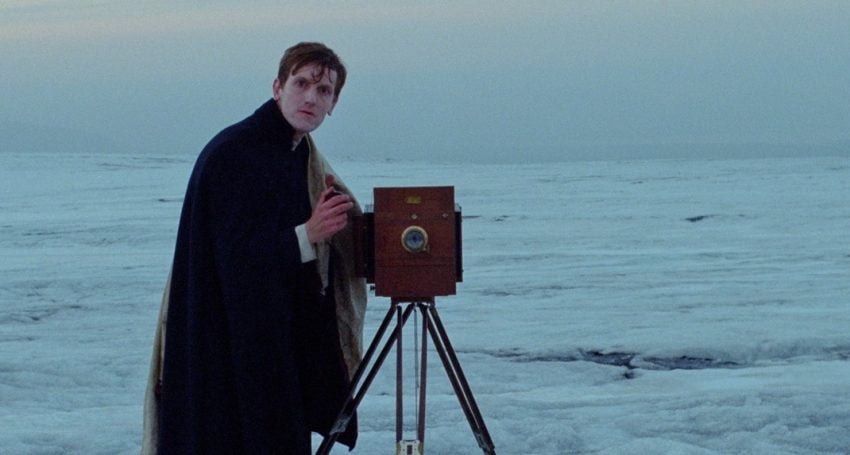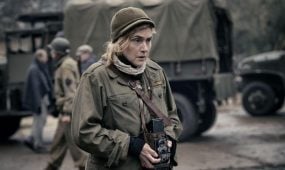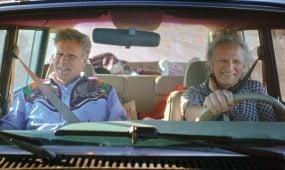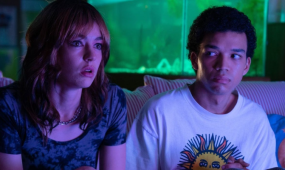Godland
Films & TV
“Immersive in the best possible way, Godland is unrelenting yet introspectively paced, doubt-laden yet prayerful, brutal and austere yet gorgeous and humbling, sombre yet exhilarating,” says Jonathan Sargeant from St Francis College

Cinematic history is littered with films exploring the clash of cultures — it’s a central idea that informs mainstream fish-out-of-water magic realist films like Barbie (2023) and Pleasantville (1998), but becomes even more interesting when religion and faith are explicitly concerned. That’s a theme deftly handled by filmmakers like Peter Weir in Witness (1985) and Paul Schrader in the stunning First Reformed (2017) where the clashing culture is one that has shifted away from the religiosity of past generations.
Godland, written and directed by Hlynur Pálmason, joins this list with a sense-shredding meditativeness that belies the descent into a heart of darkness breathed into life by the stark landscape of Iceland’s frozen coast.
Lucas (Elliott Crosset Hove) is an idealistic young Lutheran pastor sent to a late 19th century remote settlement when Iceland was a Danish territory. In foreshadowing that will surprise no-one — Lucas’ superior hints (with unexpected humour) that there are aspects of the landscape so brutal that some people lose their grip on sanity. Meeting his friendly translator (Hilmar Guðjónsson) and an Icelandic guide, Ragnar (Ingvar Sigur ðsson), Lucas begins a perilous journey that becomes a literal baptism by fire when volcanic eruption threatens the travellers. From there, Lucas’ missionary zeal is tested by both the natural and social landscapes as swollen rivers and frostbitten plains are matched by the labyrinthine web of relationships in the tiny village where Danish and Icelandic cultures groan under the weight of colonial history. Can God be found in this wilderness? Or has God left these souls behind, forgotten and lost in a land seemingly alien to human wellbeing?
Pálmason deftly draws these questions out of a script that does more with glances, grimaces and the placement of tiny people overshadowed by the gargantuan poetry of Maria von Hausswolff’s ravishing cinematography. This is definitely a film that “shows” more than “tells” the mark of good filmmaking and the essence of the director’s script. Filmed across two years, we see characters, especially the young, age noticeably. As a delayed liturgical life, a relationship with a local woman and the traversing of language barriers play out, Lucas is doomed, or is he? Will Iceland be the redemption of this Danish minister?
Advertisement
In fact, the ambiguous nature of filming the nuances of cultural missional dissent is highlighted by Lucas’ obsession with photographing his surrounds. The film starts with the text, “A box was found in Iceland with seven wet plate photographs taken by a Danish priest. These images are the first photographs of the southeast coast. This film is inspired by these photographs.”
As Lucas takes these seven shots across the course of the film, the viewer can catalogue his progress, closer to a descent. But the subtle touch of the film offers a procession of questions: Is Lucas losing his smug idealism and becoming more in touch with the rhythms of his local congregation? Is he losing a faith that he never truly understood? Or is he losing his mind, his ethical compass, his reason for being?
That these photos never actually existed — they are only an idea created by the director to inspire filmmaking — just adds more complexity to a film that has, ultimately, a simple plot yet manifold meanings sometimes deliciously just out of reach. Language itself might offer a clue. Some have suggested the film’s title in Danish Icelandic (Vanskabte Land) translates to something more like “wretched or godforsaken land” rather than Godland in the English version.
Advertisement
There are more things to say about this epic film, but they would reveal plot turns best left for viewers to discover. Immersive in the best possible way, Godland is unrelenting yet introspectively paced, doubt-laden yet prayerful, brutal and austere yet gorgeous and humbling, sombre yet exhilarating: a film that will live in your memory and musings long after you leave the cinema.
Godland, rated M and directed by Hlynur Pálmason, is currently showing in cinemas.
Editor’s note: Interested in learning more about film, the Arts, and the many intersections with life and faith? Jonathan Sargeant will be teaching DA2003Z / DA9003Z — Theology and the Arts at St Francis College in 2024. Please contact Sheilagh, Dean of Students via sheilagh.obrien@anglicanchurchsq.org.au for more information.






